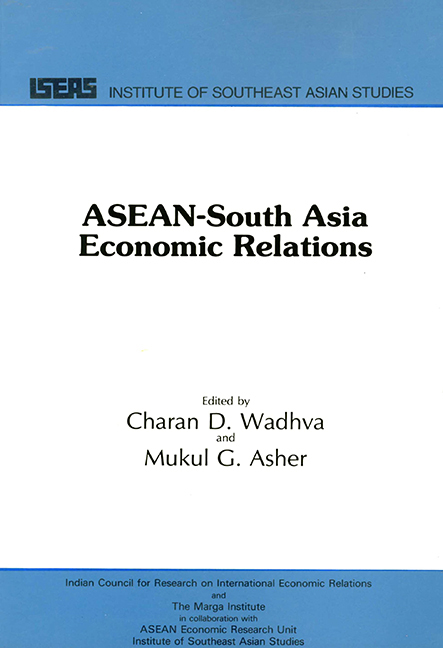Book contents
- Frontmatter
- Contents
- Foreword
- Exchange Rates of ASEAN and South Asian Countries
- An Overview
- PART ONE ASEAN COUNTRY STUDIES
- PART TWO SOUTH ASIA COUNTRY STUDIES
- Bangladesh-ASEAN Trade Relations
- Bangladesh-ASEAN Investment Relations
- India-ASEAN Economic Relations
- Nepal-ASEAN Economic Relations
- Sri Lanka-ASEAN Economic Relations
- Postscript
- Appendix SITC Classification at One-, Two-, and Three-digit Levels
- THE EDITORS
Sri Lanka-ASEAN Economic Relations
from PART TWO - SOUTH ASIA COUNTRY STUDIES
Published online by Cambridge University Press: 21 October 2015
- Frontmatter
- Contents
- Foreword
- Exchange Rates of ASEAN and South Asian Countries
- An Overview
- PART ONE ASEAN COUNTRY STUDIES
- PART TWO SOUTH ASIA COUNTRY STUDIES
- Bangladesh-ASEAN Trade Relations
- Bangladesh-ASEAN Investment Relations
- India-ASEAN Economic Relations
- Nepal-ASEAN Economic Relations
- Sri Lanka-ASEAN Economic Relations
- Postscript
- Appendix SITC Classification at One-, Two-, and Three-digit Levels
- THE EDITORS
Summary
INTRODUCTION
The ongoing discussions within the Group of 77 and at the United Nations Conference on Trade and Development (UNCTAD) on economic co-operation among the developing countries (ECDC) has created considerable interest in promoting economic relations between South Asia and the Association of Southeast Asian Nations (ASEAN), formed in 1967 and consisting of Indonesia, Malaysia, Philippines, Singapore, and Thailand. More recently, the interest in Sri Lanka-ASEAN economic relations was regenerated by the application of Sri Lanka to join ASEAN. However, Sri Lanka's application was rejected by ASEAN.
The objective of this paper is to assess the benefits of closer economic co-operation between Sri Lanka and the ASEAN countries and to identify possible schemes to further strengthen economic relations between them. In this context, it is necessary to assess – within the context of the historical background, especially since about 1970 – the state of economic relations between Sri Lanka and the ASEAN countries and also the present policy perceptions of the Sri Lanka Government which could have an impact on future economic co-operation among these countries.
The following section attempts to assess the present state of trade between Sri Lanka and the ASEAN countries by examining the trade balance and commodity flows and by calculating export intensity, import intensity, reciprocity and intra-industry trade indices. The third section reviews the state of investments and joint ventures in Sri Lanka which originate from the ASEAN countries, and the reverse flow of investment, if any. The fourth section describes the infrastructural and service links between Sri Lanka and the ASEAN countries. The final section attempts to identify the schemes to strengthen economic relations between the two sides, in the light of the preceding discussion.
Sri Lanka, traditionally dependent primarily on the export of three commodities, namely, tea, rubber, and coconuts, for its foreign exchange earnings, was forced to impose restrictions on imports and on international trade in general in the late 1950s, due to persistent balance of payment crises.
- Type
- Chapter
- Information
- ASEAN-South Asia Economic Relations , pp. 341 - 374Publisher: ISEAS–Yusof Ishak InstitutePrint publication year: 1985



